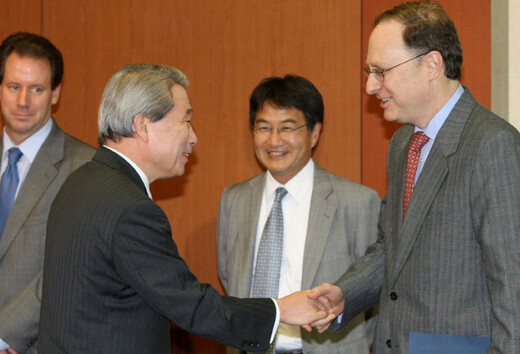hankyoreh
Links to other country sites 다른 나라 사이트 링크
Bush orders reversal of Dokdo classification

The U.S. Board on Geographic Names reversed the decision it made a week ago that changed the national classification of the South Korean islets of Dokdo to “undesignated sovereignity,” after U.S. President George W. Bush ordered it to restore the previous name status in favor of South Korea on July 30 (Washington time).
In the wake of the reversal, the U.S. federal naming agency’s Web site restored its classification of Dokdo to a group of islets under control of South Korea, from its previous designation as “undesignated sovereignty” as of 6:00 p.m. on July 30 (Eastern Standard Time). However, the U.S. agency continues to refer to Dokdo as the “Liancourt Rocks.”
In an interview that afternoon with media outlets from South Korea, China and Thailand ahead of his visits to the three countries, Bush said he had ordered the classification of Dokdo to be “restored to where it was seven days ago.”
James Jeffrey, assistant to the U.S. president and deputy national security advisor, told the South Korean Ambassador to the U.S. Lee Tae-shik, “President Bush made a direct decision and ordered that it be implemented immediately.” President Bush was believed to have received a briefing about the national classification of Dokdo from Secretary of State Condoleezza Rice earlier in the day, after which he gave the order to restore its previous classification.
“The U.S. government was seen as having taken swift action after having fully understood the importance and seriousness of the issue,” Ambassador Lee said. “The U.S. will keep the classification of ’undesignated sovereignty,’ but its application to Dokdo was excluded,” Lee said. “In the mid- and long-term, our diplomatic goal is to restore the name ‘Dokdo’ and bring the situation to where it was before 1977.”
The decision made by U.S. President Bush was seen as a political gesture to prevent an increase in anti-U.S. sentiment ahead of his visit to Seoul on August 5.
However, the U.S. government, as Bush and a State Department spokesman have emphasized, has reiterated its view on Dokdo as a “disputed area,” saying that it is a matter for South Korea and Japan to resolve.
In a meeting with South Korean Foreign Minister Yoo Myung-hwan on July 31, the U.S. ambassador to South Korea Alexander Vershbow said, “It’s interesting because a decision by low-level officials produced a political outcome that nobody could have predicted. Our stance has not changed in any respect, and nothing has changed over the past 50 years.”
In his first meeting with senior presidential aides after returning from summer vacation, President Lee said, “Given the fact that we already have effective control over Dokdo, if we make an effort, our case will be acknowledged by the international community as well as future generations.”
Please direct questions or comments to [englishhani@hani.co.kr]
Editorial・opinion
![[Editorial] Does Yoon think the Korean public is wrong? [Editorial] Does Yoon think the Korean public is wrong?](https://flexible.img.hani.co.kr/flexible/normal/500/300/imgdb/original/2024/0417/8517133419684774.jpg) [Editorial] Does Yoon think the Korean public is wrong?
[Editorial] Does Yoon think the Korean public is wrong?![[Editorial] As it bolsters its alliance with US, Japan must be accountable for past [Editorial] As it bolsters its alliance with US, Japan must be accountable for past](https://flexible.img.hani.co.kr/flexible/normal/500/300/imgdb/original/2024/0417/6817133413968321.jpg) [Editorial] As it bolsters its alliance with US, Japan must be accountable for past
[Editorial] As it bolsters its alliance with US, Japan must be accountable for past- [Guest essay] Amending the Constitution is Yoon’s key to leaving office in public’s good graces
- [Editorial] 10 years on, lessons of Sewol tragedy must never be forgotten
- [Column] A death blow to Korea’s prosecutor politics
- [Correspondent’s column] The US and the end of Japanese pacifism
- [Guest essay] How Korea turned its trainee doctors into monsters
- [Guest essay] As someone who helped forge Seoul-Moscow ties, their status today troubles me
- [Editorial] Koreans sent a loud and clear message to Yoon
- [Column] In Korea’s midterm elections, it’s time for accountability
Most viewed articles
- 1[Column] The clock is ticking for Korea’s first lady
- 2[News analysis] After elections, prosecutorial reform will likely make legislative agenda
- 3Samsung barricades office as unionized workers strike for better conditions
- 4S. Korea, Japan reaffirm commitment to strengthening trilateral ties with US
- 5[Editorial] When the choice is kids or career, Korea will never overcome birth rate woes
- 6Why Israel isn’t hitting Iran with immediate retaliation
- 7Korea, Japan jointly vow response to FX volatility as currencies tumble
- 8[Editorial] Does Yoon think the Korean public is wrong?
- 9Strong dollar isn’t all that’s pushing won exchange rate into to 1,400 range
- 10[Guest essay] How Korea turned its trainee doctors into monsters